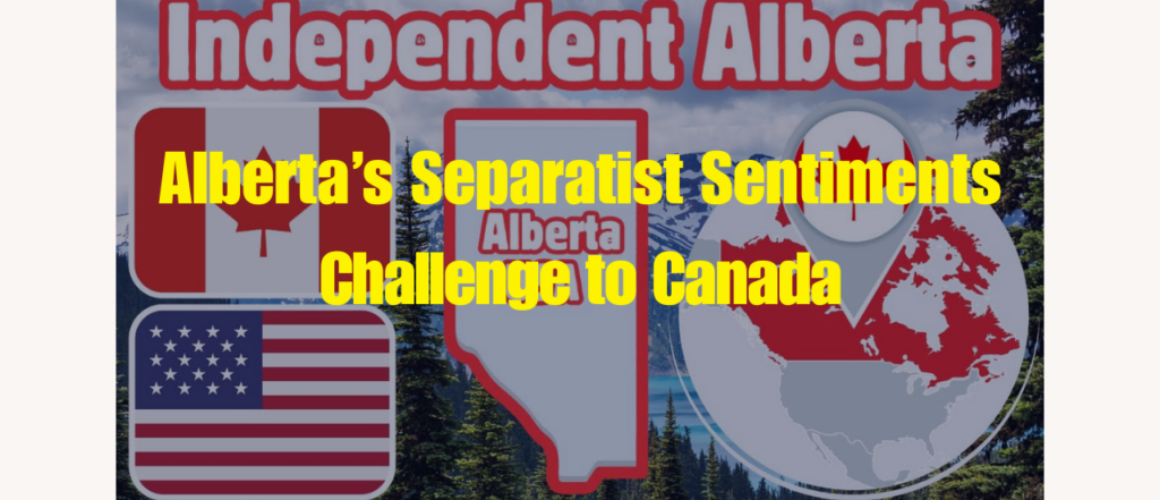Alberta’s Separatist Sentiments: A Renewed Challenge to Canadian Unity

Introduction
Alberta—the engine of Canada’s energy economy—is once again echoing with the chants of regional alienation. While calls for independence have flared before, the current wave of separatist sentiment feels different. Fueled by economic uncertainty, environmental policy clashes, and long-standing grievances over federal transfers, a growing segment of Albertans is no longer just frustrated—they’re asking whether confederation still serves their interests.
Under Premier Danielle Smith’s leadership, the rhetoric of “Alberta First” has escalated beyond political posturing into legislative action. From the Alberta Sovereignty Act to open challenges against Ottawa’s carbon pricing regime, Alberta is reasserting itself not merely as a province—but as a political identity in conflict with the federal state.
The Root of Discontent: Energy, Equity, and Autonomy
Alberta’s economic foundation is fossil fuel wealth. The province contributes billions annually to the federal purse through resource royalties and taxes, yet feels shackled by federal policies it perceives as anti-oil.
Three central issues drive this divide:
- Federal Climate Mandates: Carbon pricing, emissions caps, and environmental regulations disproportionately impact Alberta’s oil and gas industry. Many see this as a direct threat to jobs and economic sovereignty.
- Equalization Payments: Alberta, a “have” province, contributes significantly more than it receives. Critics argue that the current formula penalizes economic productivity and rewards mismanagement in other provinces.
- Cultural and Political Misalignment: A socially conservative and economically libertarian ethos in Alberta often clashes with progressive central Canadian values, especially on issues like gun rights, vaccine mandates, and school curriculum policies.
The combination of economic frustration and cultural divergence has created fertile ground for the idea of “independence,” or at minimum, greater provincial autonomy.
Danielle Smith and the Rise of Soft Separatism
Premier Smith has deftly walked the line between nationalism and governance. While not openly calling for Alberta to secede, her administration has taken calculated steps toward asserting quasi-sovereign powers:
- The Alberta Sovereignty Within a United Canada Act grants the province power to ignore federal laws deemed unconstitutional or against Alberta’s interests.
- Provincial Police Force Feasibility Studies are underway to replace the RCMP with a made-in-Alberta alternative.
- Pensions and CPP Debate: Alberta is exploring withdrawing from the Canada Pension Plan in favor of a provincial version.
These moves may not represent outright secession, but they do signal a form of institutional defiance—an attempt to reshape federalism through the lens of provincial self-interest.
National Implications: A Stress Test for Confederation
The resurgence of Alberta’s separatist voice challenges the federal government on multiple fronts:
- Policy Response vs. Political Optics: Ottawa must balance climate targets with fairness, ensuring that Alberta isn’t unfairly punished in the national decarbonization effort.
- Public Sentiment Nationwide: A 2024 Ipsos poll showed 31% of Albertans support separation, while national sympathy remains low. This creates a political trap—concessions to Alberta risk alienating other provinces.
- Precedent Setting: If Alberta successfully carves out autonomy in policing, pensions, or resource control, other provinces—particularly Quebec—may follow suit, fragmenting national cohesion.
More subtly, Alberta’s separatist push emboldens populist narratives across Canada, eroding the public’s trust in the idea of a unified, balanced federation.
The Road Ahead: Autonomy or Acceleration?
Alberta’s path forward will depend on several key developments:
- Federal Response: Will the Trudeau (or Carney) government adjust environmental timelines or equalization formulas to address Alberta’s grievances?
- Provincial Follow-Through: Can Alberta build the administrative and economic infrastructure needed to replace federal programs (like CPP or RCMP)?
- Economic Outcomes: If oil prices decline or diversification fails, separatist fervor may fade. But a prosperous Alberta with little federal interference could reignite the cause.
While full separation remains unlikely due to economic interdependence and constitutional complexity, the more realistic scenario is decentralization—a reimagining of confederation that shifts power away from Ottawa.
Conclusion
Alberta’s separatist current isn’t just a political wave—it’s a deeper signal that Canada’s federation is under pressure. In a nation founded on compromise and diversity, renewed conversations on autonomy, representation, and regional equity are not just inevitable—they are necessary.
The test for Canada is not whether Alberta stays, but whether it feels it belongs.